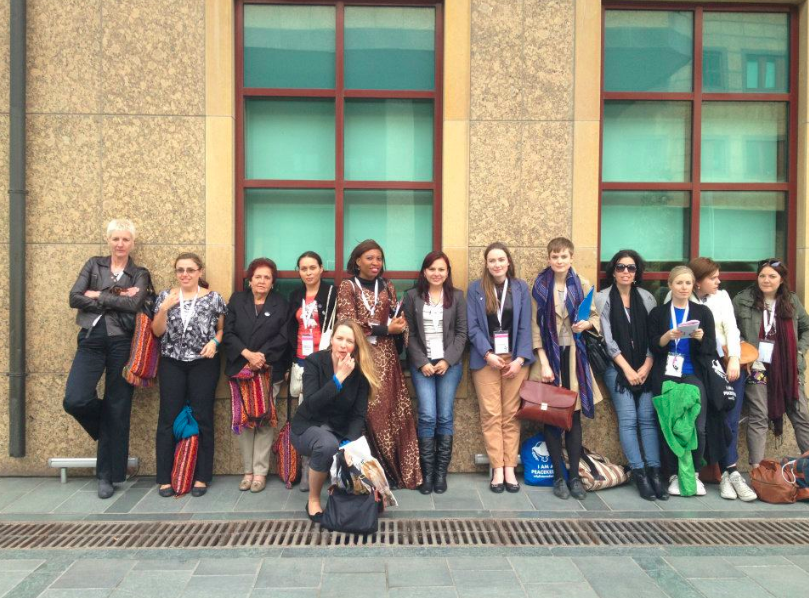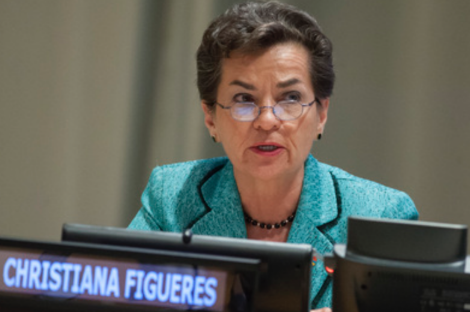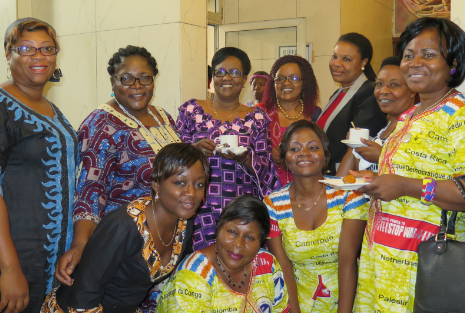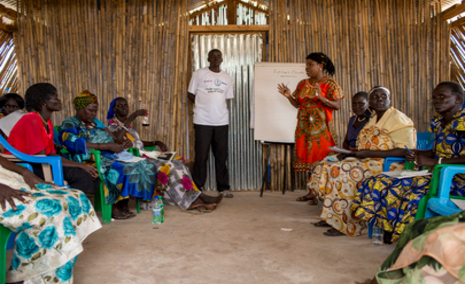WOMEN PEACE AND SECURITY E-NEWS AUGUST 2016
AWID International Forum in Preview
By WILPF PeaceWomen Programme Associate Grace Jennings-Edquist
WILPF delegates at the last AWID International Forum (Photo: WILPF)
Every four years, WILPF delegates travel abroad to participate in the AWID International Forum on Women’s Rights and Development. WILPF was very active at the 2012 AWID forum, holding sessions on challenging militarism and using economic power to promote change in conflict zones, and participating in a panel discussion after a screening of I Came To Testify. One of the great successes of WILPF’s involvement in the forum was a lively information booth set up to network and provide information on the organisation to other women activists participating in the conference.
In two weeks, that WILPF information booth – along with 18 WILPF delegates from eight countries – will return to the AWID Forum. There, WILPF delegates including WILPF/PeaceWomen’s director Dr Abigail Ruane will share experiences and construct innovative strategies to build feminist futures, discussing the theme “Feminist Futures: Building Collective Power for Rights and Justice.”
This year, WILPF’s PeaceWomen team is particularly excited about AWID – not just because WILPF will be hosting several events there (and not just because the conference is taking place sunny Brazil this year,) but because WILPF/PeaceWomen will be launching our toolkit on women, peace and security financing at the forum on September 9.
The toolkit, which will be available on the PeaceWomen website at www.peacewomen.org/wps-
If the international community wants peace, it needs to invest more in gender equality and social justice policies. However, at a time of the attempted silencing of progressive voices and governments’ increasing preference for funding anti-terror initiatives rather than peace and gender equality, it is particularly essential now that civil society advocate for strengthened funding of women, peace and security initiatives.
The 2016 AWID International Forum - a space for feminist and women’s peace groups to renew solidarities and advance concrete, joint action agendas - is the perfect space for WILPF/PeaceWomen to share its ideas about how this could be done, and explore new ways of working together with allies that help build our collective power. We look forward to sharing the toolkit with you on 9 September, and in next month’s E-News!
Reflecting On The 2016 High-Level Political Forum
By Madison Chapman
Christiana Figueres, former Executive Secretary of the UN Framework Convention on Climate Change, addresses the High-Level Political Forum. (Photo: UN Photo/Loey Felipe)
On 11-20 July, 2016, the UN Division for Sustainable Development Department of Economic and Social Affairs (DESA) facilitated the first annual High-Level Political Forum for Sustainable Development (HLPF). This year prioritised the theme “Ensuring No One Is Left Behind.” As part of our work to strengthen conflict prevention and promote accountability on gender equality and peace, WILPF monitored the forum for gender and conflict issues. We also leveraged this space to build momentum on strengthening accountability and financing of gender equality and peace through a workshop and follow up side side event on WPS Financing.
The HLPF included several key plenary sessions to address Agenda 2030, including a session entitled “Ensuring that No One is Left Behind: Creating Peaceful and More Inclusive Societies and Empowering Women and Girls.” It also included submission of National Voluntary Reviews from 22 Member States. Of these states, 16 (72%) mentioned SDG 5, which focuses on empowering women and girls, while only 14 (59%) directly mentioned SDG 16, which promotes stable and peaceful societies.
While the HLPF shared good practices and key gaps in implementation, it lacked a strong and consistent gender or militarism perspective and had significant gaps in terms of inclusiveness of processes. Unfortunately, we are off to a to a rocky start in implementing Agenda 2030 on issues of gender equality and stable and peaceful societies. WILPF reminds states that there can be no development without disarmament and women’s full and equal participation and rights.
The full report on WILPF/ PeaceWomen monitoring of the 2016 HLPF can be accessed here.
Inside the Security Council Open Debate on Non-Proliferation of Weapons of Mass Destruction
By Marina Kumskova
UN Secretary-General Ban Ki-moon addresses the Security Council (Photo: UN Photo/JC McIlwaine).
On Tuesday 23 August, 2016, under the Japanese presidency, the Security Council held an open debate under the theme, "Challenges in Addressing Proliferation of Weapons of Mass Destruction (WMDs), their means of delivery and related materials."
The dominant themes of the debate were the importance of improving national capabilities and international cooperation to detect, stop and deter the trafficking of illegal weapons, and the need to enhance mechanisms ensuring the safeguard of nuclear weapons and materials. Specifically, all Member States underscored the evolving threat of such weapons falling into the hands of non-State actors and terrorist groups.
Sadly, the representative of Panama was the only speaker to bring the Council’s attention to the clear link between the proliferation of WMDs, heightened militarism and its negative effect on women's security. Aside from this statement, no mention of gender was made by all speakers including the Secretary-General. As it is clear from the analysis, national ambitions for control of territory, markets and populations will continue to be a serious threat. It is in the hands of political actors – nation states, alliances of states, non-state militias – that weapons systems do their deadly work. Disarmament and non-proliferation instruments are only as successful as Member States’ capacity and desire to implement them.
For a more detailed analysis of the debate, please click here.
Progress on Cameroon's UNSCR 1325 NAP
By Joanna Lockspeiser
WILPF members filled with inspiration after the 2015 regional conference on conflict prevention (Photo: Tove Ivergard/WILPF Sweden)
There have been great steps made towards the adoption of a National Action Plan (NAP) on UN Security Council Resolution (UNSCR) 1325 for Cameroon. On 21 July, 2016, the government of Cameroon sent out a call for submissions for two individual consultants to support the NAP development. The consultants will support the Ministry in developing a plan to achieve full and equal participation of women, gender mainstreaming in peace and security initiatives and the full implementation of UNSCR 1325.
The move follows several successful awareness-raising workshops, lobbying and advocacy activities held by civil society under the leadership of WILPF Cameroon. This included a December 2014 study by WILPF Cameroon, with the support of WILPF/PeaceWomen, to assess the level of knowledge about UNSCR 1325. In November 2015, WILPF Cameroon also hosted WILPF Africa’s Regional Conference on the participation of women in conflict prevention and crisis management, followed immediately by a series of advocacy visits including a meeting with the Minister of Women's Empowerment and the Family.
We look forward to WILPF Cameroon’s continued involvement and urge the government of Cameroon to continue to include civil society in all phases of the NAP; development, implementation and monitor and evaluation.
For more information on the NAP workshop, read here.
WILPF to Attend AWID's 13th International Forum in Brazil
By Joanna Lockspeiser
(Photo: Association for Women's Rights in Development)
Just one week to go before more than 2,000 participants come together in Brazil for AWID’s 13th International Forum! The theme this year is “Feminist futures: Building Collective Power for Rights and Justice.” This year the Forum will take place from 8 September until 11 September at the Costa do Sauipe Resort in Bahia, Brazil. WILPF will be participating with a delegation of 19 women from eight countries.
WILPF will be hosting and participating in many exciting events throughout the Forum:
“Feminist Playbook for Peace” is a a cross-movement session where we plan to build on the WILPF 100th and explore how to create feminist solutions, strengthen alliances, share practical skills, and construct innovative strategies to transform existing structures, policies and approaches, prevent violence, and bring peace;
WILPF/PeaceWomen will also launch its women, peace and security financing toolkit about how to #MoveTheMoney from war to peace at AWID’s feminist resource mobilisation hub;
WILPF Sections Sweden, Cameroon, Nigeria and DRC will co host “Women’s Power to Stop War - Peace across borders - Regional Cooperation in Africa”;
WILPF’s Laila Alodaat will speak on Syrian activists at the session entitled “What does solidarity look like? A cross-movement dialogue on challenging religious fundamentalisms”;
WILPF will co-host a session entitled “Local peace building initiatives define the future: sharing the experiences of Syrian and Iraqi women groups combating violence and building peace”;
- In partnership with AWID, WILPF will host a session entitled “Positioning the binding Treaty on Transnational Corporations towards protecting the rights of WHRD's and minority constituencies”;
WILPF will hold a closed meeting "Dialogues on Power, Participation, and Peace"; and
- WILPF Africa will host their Regional Meeting.
For more information on the AWID Forum, see the AWID site here.
For the schedule of WILPF’s engagement at the Forum, see here.
An Analysis of Chapter Eight of the Global Study, "Preventing Conflict: The Origins Of The Women, Peace and Security Agenda"
By Marta Bautista
UNMISS Civil Affairs Division Conducts Mediation Workshop. (Photo: UN Photo/JC McIlwaine)
Chapter eight of the Global Study on the implementation of UNSCR 1325 addresses the need to prevent war and to use force only as a last resort. Women around the world have continued to demand the end of war and global disarmament, pointing out that the international community has for too long used militarism at the expense of integrating prevention measures and addressing root causes. In fact, one of the main demands of UNSCR 1325 and the Women, Peace and Security (WPS) agenda is the use prevention as a key measure for the Security Council.
This chapter commends the WPS agenda for valuing both operational (short-term) and structural (long-term) approaches to prevention. The study also points out that conflict prevention and early warning measures include overcoming the exclusion of women and girls; eliminating gender-based violence; achieving gender equality and eliminating discrimination; addressing arms proliferation; and working towards climate change prevention.
Facts and Figures:
- Militarism and cultures of militarised masculinities create and sustain political decision-making where resorting to the use of force becomes a normalized mode for dispute resolution (Global Study 2015, 207).
Studies in Kosovo and Sierra Leone found that women had valuable information about the accumulation of weapons and violent attacks being planned, but had no means of reporting or sharing this information (Global Study 2015, 198).
In furthering the use of information and communication technologies in conflict prevention, there are key gender-specific access and control concerns that often correspond with pre-existing barriers to women’s access to power and resources (Global Study 2015, 202).
Despite their direct experience coping with climate change and resource scarcity, women are severely under-represented in decision-making on natural resource management in fragile and conflict-affected settings (GLobal Study 2015, 212).
Key recommendations:
Member States should adopt gender-responsive budgeting practices, including through consultation with civil society, as a strategy to address militarised state budgets and their destabilising impact on international peace and security and women’s rights (Global Study on 1325, 214).
Women’s organizations, that have key insights into changing power relations, should be actively engaged in roles that allow them to maximize the impact of this valuable knowledge within existing mechanisms (Global Study 2015, p. 198).
Member States, the UN, regional and international organisations should include women’s participation, gender-responsive indicators and sexual and gender-based violence related indicators in all early-warning processes and conflict prevention (Global Study on 1325, 214).
Member States should revise their National Action Plans (NAPs) to, as relevant, address the role of climate-related resource scarcity and natural disaster response in exacerbating conflict, and provide inclusive solutions to resource-related insecurity (Global Study 2015, 215).
For more information, see UN Women’s Global Study Factsheets or the entire Global Study on Women, Peace and Security.







WILPF Initiatives
Joint Statement: Humanitarian Corridor Proposal Deeply Flawed
Post-Conflict Economic Reform Is A Women, Peace And Security Issue
WILPF Sections Arrive In Geneva For Second Conference Of States Parties To The Arms Trade Treaty
WILPF Statement To The Second Conference Of States Parties To The Arms Trade Treaty Implementation
WILPF Publishes Case Studies On Spain And Sweden Related To Gender-Based Violence And Arms Exports
Reports, Resources & Policy Briefs
Monthly Action Points (MAPs): August, 2016
Still No Country For Women? Double Standards In Choosing The Next UN Secretary-General
Candidates For The Post Of UN Secretary-General: Where Do They Stand On Human Rights?
Expert’s Take: Is Funding For Gender-Responsive Peacebuilding Pie In The Sky?
We Can No Longer Ignore Nauru: Atrocities Against Women, Children Plague Australian Detention Centre.
External Initiatives
AWID Forum Registration Page
Join On The Road To Bahai, Brazil: A Pre-Forum Webinar For Participants